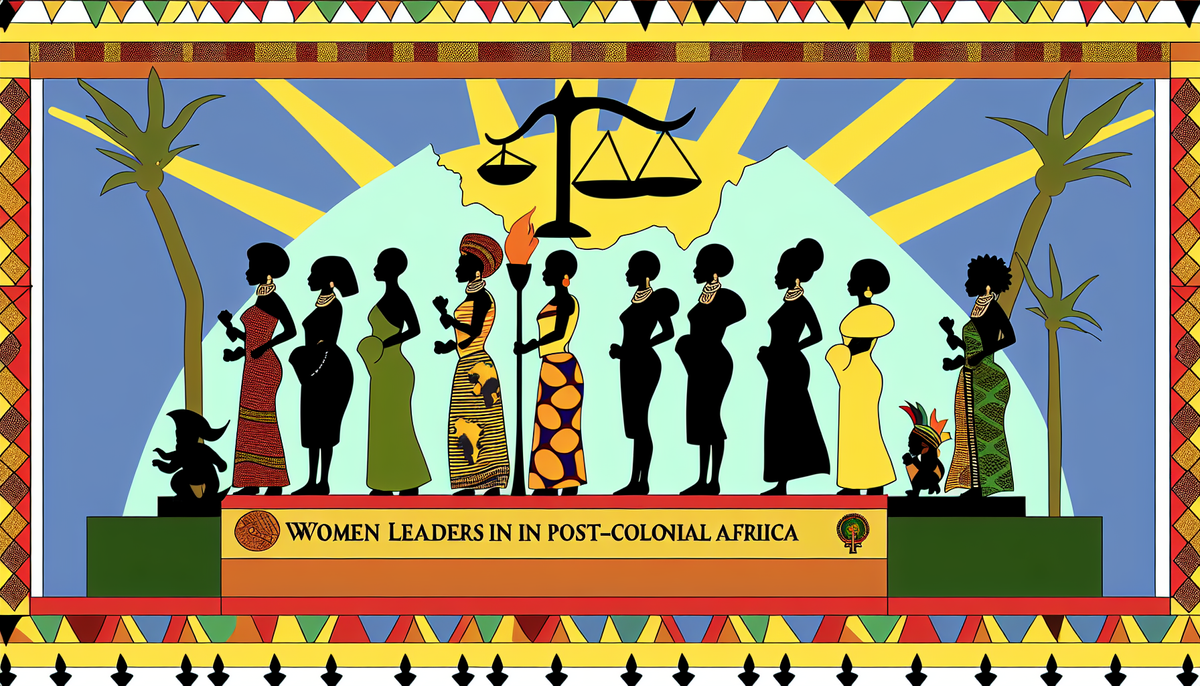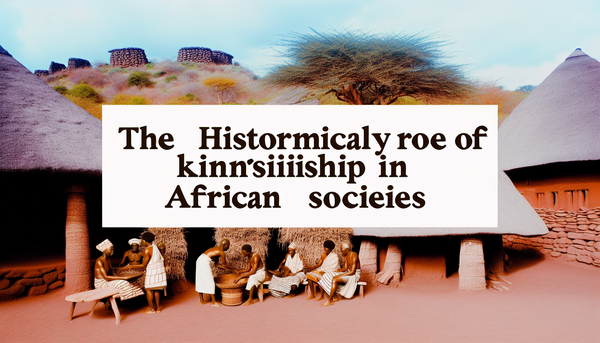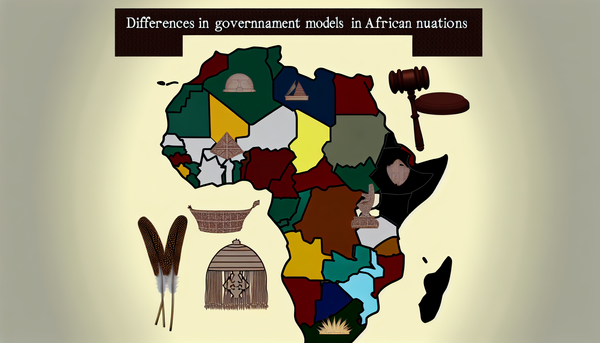Women Leaders in Post-Colonial Africa

Introduction: Setting the Stage for Women's Leadership Post-Independence
The landscape of post-colonial Africa is deeply intertwined with the narratives of resilience, empowerment, and transformation, particularly in the context of women's leadership. As many African nations emerged from colonial rule, they faced the formidable challenge of nation-building, which necessitated the inclusion of diverse voices, especially women's perspectives. Historically relegated to the margins, women in these societies began to assert their rights and roles, marking a significant shift in political, social, and economic spheres.
The struggle for independence not only paved the way for new governments but also empowered women to seek participation in the decision-making processes that would shape their nations. Pioneering female leaders emerged, challenging traditional norms and stereotypes, and advocating for gender equality.
This era catalyzed grassroots movements that rallied women from various backgrounds to unite under common aspirations for justice and equity. In this exploration of women's leadership in post-colonial Africa, we will delve into the contributions of these remarkable leaders, their influence on policies, and how they inspired future generations to strive for a more inclusive and equal society. The journey is a testament to the enduring spirit of women, who have played a crucial role in the continent's evolution.
Pioneering Female Politicians: Trailblazers of the Early Years
In the aftermath of colonial rule, a cadre of visionary women stepped into political arenas, breaking barriers and redefining leadership in their respective countries. These pioneering female politicians not only challenged the status quo but also became trailblazers whose influence reverberated across the continent. Figures such as Ellen Johnson Sirleaf in Liberia, who later became Africa's first female president, and Wangari Maathai in Kenya, renowned for her environmental activism and Nobel Peace Prize laureate, exemplify this transformative leadership.
Many of these early leaders emerged from grassroots movements, leveraging their social capital to advocate for women’s rights and broader societal change. They initiated critical conversations about gender equality, education, and health care, often using their political platforms to address pressing issues that affected their communities.
Their courage inspired a new generation of women to engage in politics, positioning themselves as agents of change within traditionally male-dominated spaces. As they navigated challenges, these trailblazers laid the groundwork for future female leaders, proving that women's voices are integral to the fabric of governance. Their legacies illuminate the importance of inclusive leadership in shaping resilient, equitable nations in post-colonial Africa and beyond.
Transformative Education Policies: Empowering the Next Generation
Education has always been a powerful tool for social change, and in post-colonial Africa, women leaders recognized its vital role in empowering future generations. Transformative education policies emerged as essential strategies to dismantle systemic barriers and facilitate equal access to learning opportunities. Pioneering women politicians advocated for comprehensive reforms that prioritized education for girls, understanding that knowledge is foundational for economic independence and social equity.
These leaders championed initiatives to improve both enrollment and retention rates of girls in schools, addressing issues like child marriage and cultural biases that hindered educational access. They introduced policies that provided scholarships, built schools in underserved communities, and promoted gender-sensitive teaching methodologies. Notable figures such as Malala Yousafzai, although from Pakistan, have had a significant impact across Africa, emphasizing the right to education for every girl.
Additionally, women's involvement in educational policymaking has underscored the importance of inclusive curricula that celebrate local cultures and histories. As a result, countless young women have gained the skills and confidence necessary to pursue careers, engage in civic activism, and assert their rights. These transformative educational policies have not only empowered the next generation but have also contributed to the broader societal transformation necessary for sustainable development in post-colonial Africa.
Economic Influences: Women Spearheading Change
Women have long been pivotal in driving economic change across post-colonial Africa, often serving as catalysts for innovation and entrepreneurship. In many communities, women are not only the backbone of household economies but also key players in local and national markets. As political landscapes evolved, female leaders utilized their platforms to advocate for policies that support women's economic participation, recognizing that empowering women is tantamount to uplifting entire communities.
The rise of microfinance initiatives, championed by influential women, has revolutionized access to capital for aspiring female entrepreneurs. Programs providing loans and business training have enabled women to launch small enterprises, thus contributing to job creation and economic resilience. Noteworthy initiatives like the African Development Bank's Affirmative Finance Action for Women in Africa (AFAWA) have further bolstered this movement by addressing financial barriers and fostering an environment conducive to female entrepreneurship.
Additionally, women have played crucial roles in sectors such as agriculture, trade, and technology, driving progress and fostering sustainable development. Their involvement ensures diverse perspectives in economic policy-making and promotes gender equality. By spearheading these changes, women leaders in Africa are transforming economic landscapes, demonstrating that gender equity is not just a moral imperative but also a pathway to prosperity and development.
Cultural Shifts and Social Movements Driven by Women
In post-colonial Africa, women have been at the forefront of cultural shifts and social movements, challenging longstanding traditions and advocating for progressive values. Recognizing that social change is integral to national development, female leaders have tirelessly worked to reshape societal narratives, promoting gender equality and women's rights. These shifts have often stemmed from grassroots movements that empower women to reclaim their voices and assert their identities.
Notable movements, such as the "Bring Back Our Girls" campaign in Nigeria, highlighted the plight of women and girls affected by violence and abduction, sparking international awareness and mobilizing action. Women activists have also taken on significant challenges, addressing issues such as gender-based violence, reproductive rights, and political representation. Their efforts have inspired cultural narratives that celebrate female strength and resilience.
Through art, literature, and performance, women have utilized creative expression to illuminate their experiences, fostering solidarity and encouraging dialogue around critical social issues. Furthermore, by standing against patriarchal norms, women have prompted society to reevaluate cultural practices that perpetuate inequality. In effect, women's leadership in these cultural and social movements has not only catalyzed significant progress but has also ensured that future generations can aspire to a more equitable and just society.
Contemporary Leaders and Global Impact
In the realm of contemporary leadership, African women have emerged as powerful figures influencing both national policies and global dialogues. Leaders such as Ellen Johnson Sirleaf, the first female president of Liberia, and Ngozi Okonjo-Iweala, the Director-General of the World Trade Organization, exemplify the profound impact women can have on a global scale. Their accolades and leadership roles reflect the growing recognition of women's critical contributions to governance, economics, and international relations.
These contemporary leaders have championed issues ranging from sustainable development to health care, advocating for gender equality and social justice on international platforms. Their work has garnered international attention, igniting conversations about women's representation in leadership and the importance of diverse perspectives in addressing global challenges.
Moreover, initiatives led by women, such as the African Union's Agenda 2063, emphasize empowerment through education, economic growth, and the promotion of peace. Through their commitment to forging connections and alliances, these leaders are dismantling stereotypes and paving the way for future generations.
The ripple effects of their efforts extend beyond their borders, fostering collaborations that enhance global understanding and cooperation. By amplifying women's voices and advocating for inclusive policies, contemporary female leaders are not only reshaping Africa’s future but also setting a precedent for positive change worldwide.
Conclusion: The Ongoing Journey of Empowerment
The journey of empowerment for women in post-colonial Africa is ongoing, marked by remarkable achievements and persistent challenges. While significant strides have been made in political representation, economic participation, and social activism, the quest for gender equality remains a dynamic and evolving endeavor. The trailblazing efforts of early female politicians laid the foundation for contemporary leaders who are now influencing global discussions and shaping policies that prioritize inclusivity and equity.
However, the path forward demands continuous commitment to confronting systemic barriers and cultural norms that inhibit women's advancement. Issues such as gender-based violence, unequal pay, and limited access to education still plague many communities. As women harness their collective power through grassroots movements, innovative leadership, and collaborations across various sectors, they are redefining narratives and inspiring change.
The empowerment of women is not merely a goal but a fundamental pillar for sustainable development. By investing in women's education, health, and economic opportunities, societies can unlock their full potential, fostering resilience and prosperity. The ongoing journey of empowerment invites all stakeholders—governments, organizations, and communities—to unite in a shared vision of equality, ensuring that future generations of women can thrive and contribute to a just and equitable world.



